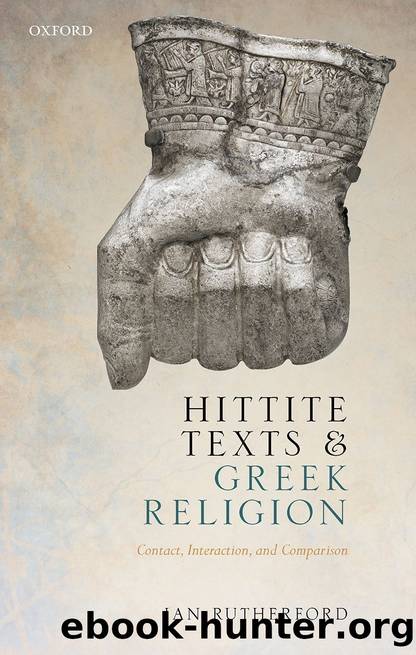Hittite Texts and Greek Religion by Ian Rutherford

Author:Ian Rutherford [Rutherford, Ian]
Language: eng
Format: epub
Publisher: Oxford University Press
Published: 2020-08-29T00:00:00+00:00
9.5.1 The Storm God, Sun Deity
I discussed the Storm god and Sun deities on p. 32. The Hittites saw the Storm god as the most important deity in the pantheon, as is implied in the Instructions for the Frontier Post Governors (Miller 2013: no. 17; CTH 261.1, §33):85
Further, reverence (nahsaraz) for the deities shall be maintained; for the Storm God, though, reverence shall be firmly established.
The total number of epithets used of him, which gives us a rough guide to the number of forms he took, runs into the hundreds.86 Of all Hittite LBA theonyms, this is the one that survived best in the Anatolian and Neo-Hittite religious systems of the 1st millennium bc (see p. 54).
Tarhunna readily undergoes identification with analogous deities of other religious systems. He is similar to the N. Syrian Storm god Adad, and in the Hurrian pantheon he was identified with Tessub. His major associations included rain, fertility and, at least in the South-East, the growth of the vine.87
Zeus is obviously a similar figure, although he was originally a sky god (*Diweus). The Storm god has the epithet ḫeuwas (‘of rain’) in a calendar from Hakmis and Zeus is called Huetios or Hues ‘of rain’.88 The symbol of Zeus’ lightning bears a resemblance to the Storm god’s thunder, at least as we see it on Neo-Hittite monuments; the trident of Poseidon (in some ways a Storm god himself) bears a resemblance as well.89
Notice, however, that in one important respect the Greek pantheon seems closer to the Ugaritic one than the Hittite one, namely that the three brothers Zeus, Poseidon, and Hades, sons of Kronos seem to be a close equivalent to Baal, Yamm, and Mot, the sons of El. This would be one more reason for believing that the Levant played a role in the development of early Greek mythology.90
With respect to the Sun deity, Greek religion seems very different, since neither Helios nor any other sun deity has such an important position either in the 1st millennium or in the LBA.91 Nevertheless, Helios was important in oaths, a role he has already in the Iliad.92 Thus, when the Hittite king in the Tawagalawa letter (AhT4§15) referred to the Sun god (as was common in diplomatic contexts), the Mycenaeans may well have understood this as Helios (*Hawelios).
Download
This site does not store any files on its server. We only index and link to content provided by other sites. Please contact the content providers to delete copyright contents if any and email us, we'll remove relevant links or contents immediately.
The Lost Art of Listening by Michael P. Nichols(7506)
Why I Am Not A Calvinist by Dr. Peter S. Ruckman(4153)
The Rosicrucians by Christopher McIntosh(3521)
Wicca: a guide for the solitary practitioner by Scott Cunningham(3179)
Signature in the Cell: DNA and the Evidence for Intelligent Design by Stephen C. Meyer(3138)
Real Sex by Lauren F. Winner(3023)
The Holy Spirit by Billy Graham(2953)
To Light a Sacred Flame by Silver RavenWolf(2823)
The End of Faith by Sam Harris(2742)
The Gnostic Gospels by Pagels Elaine(2531)
Waking Up by Sam Harris(2461)
Nine Parts of Desire by Geraldine Brooks(2369)
Jesus by Paul Johnson(2362)
Devil, The by Almond Philip C(2332)
The God delusion by Richard Dawkins(2309)
Heavens on Earth by Michael Shermer(2284)
Kundalini by Gopi Krishna(2185)
Chosen by God by R. C. Sproul(2164)
The Nature of Consciousness by Rupert Spira(2108)
